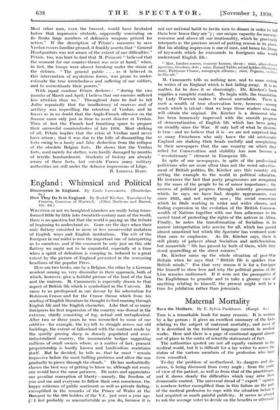England : Whimsical and Political
WDE.TFIER or not we benighted islanders are really being trans- formed little by little into twentieth-century men of the world, there is no question but that the world is paying us the tribute of beginning to understand us. Gone are the days when their only flattery consisted in more or less unsuccessful imitation of English ways and English institutions. The role of the foreigner in our midst is now the important one of interpreting us to ourselves, and if the comment be only just on this side flattery we ought not to be ungrateful, especially at a time when a spirit of defeatism is creeping in, induced to a great extent by the picture of England presented in the screaming headlines of the popular Press.
Here are two books, one by a Belgian, the other by a German resident among us, very dissimilar in their approach, both of which, however, give a faithful picture of the land of the lion and the unicorn. M. Cammaerts is especially drawn to that aspect of British life which is symbolized in the Unicorn. He came to us predisposed in our favour by his admiration for Robinson Crusoe and for the Crusoe theme which from his reading of English literature he thought to find running through English life and the English character. Like that of so many foreigners his first impression of the country was dismal in the extreme, chiefly consisting of fog, actual and metaphorical.. After two or three years he was reconciled to some of our oddities--for example, the ivy left to straggle across our old' buildings, the extent of fallowland with the contrast made by' the quietly grazing sheep in densely populated and over-: industrialized country, the innumerable hedges suggesting. millions of small owners where, as a matter of fact, peasant. proprietorship is hardly known and landlordism maintains itself. But he decided, he tells us, that he must remain impassive before the most baffling problems and allow the sun gradually to pierce through the clouds." He has undoubtedly chosen the hest way of getting to know us, although not every one would have the same patience. He notes and appreciates our peculiar conception of liberty—namely, tine freedom of you and me and everyone to follow their own conscience, the happy reticence of public sentiment as well as private feeling,' exemplified in the remarks of the Prince of Wales at the Banquet to the 300 holders of the V.C. just over a year ago C: I feel probably as uncomfortable as you do, because it is
not our national habit to invite men to dinner in order to tell them how brave they are") ; our unique capacity for nursery. nonsense and above all our irrationality, which he graciously interprets as the precious secret of putting reason in its place. But his abiding impression is one of mist, and hence his litany of keywords which he commends to foreigners who would understand English life :
" Mist, lumber-rooms, country houses, sheep ; mist, after-dinner speeches, freedom, dole ; mist, Round Table, social ladder, Olympus; mist, Robinson Crusoe, autograph albums ; mist, Pegasus, castles- in-the-air."
M. Cammaerts tells us nothing new, and to some extent he writes of an England which is fast fading away. It is no matter, for he does it so charmingly. Dr. Kircher's book supplies a complete contrast. To begin with, the translation by Lady Warwick makes it almost unreadable. Thew is such a wealth of true observation here, however—among much which is trivial—that we hope those readers 'who can will obtain the original. Dr. Kircher is a democrat who has been immensely impressed with the smooth progress of democratization of English life which has been going on steadily since the War. If only half of what he discerns is true—and we believe that it is—we are not surprised that so many Frenchmen who only knew the old aristocratic England are shaking their heads ruefully and complaining in their newspapers that the one country on which they relied for Conservatism and stability has now become a " revolutionary " element in European life.
In spite of our newspapers, in spite of the professional politicians who are more often than not the worst advertise- ment of British politics, Dr. Kircher secs this country still setting the example to the world in political education, He instances the fact that party programmes are recognized by the mass of the people to be of minor importance ; the success of political progress through minority government which, Inc says, we have had, despite appearances, ever since 1923, and not merely now ; the social conscience which he fmds working in wider and wider classes, and finding expression in the evolution of the British Common- wealth of Nations together with our firm adherence to the sacred trust of protecting the rights of the natives in Africa. Finally, he notes the transformation of Socialism in its narrow interpretation into service for all, which has passed almost unnoticed but which the Spectator has ventured more than once to emphasize. As Dr. Kircher says, there is still plenty of palaver about Socialism and anti-Socialism, but meanwhile " life has passed by both of them, while they stood quarrelling at the street corners."
Dr. Kircher sums up the whole situation of post-War Britain when he says that " British life is quicker than British minds." For that very reason it is for a foreigner like himself to show how and why the political genius of the Lion remains undimmed. If it were not the prerogative of the Englishman to grumble and to take a gloomy view of anything relating to himself, the present might well be a time for jubilation rather than jeremiads.










































 Previous page
Previous page